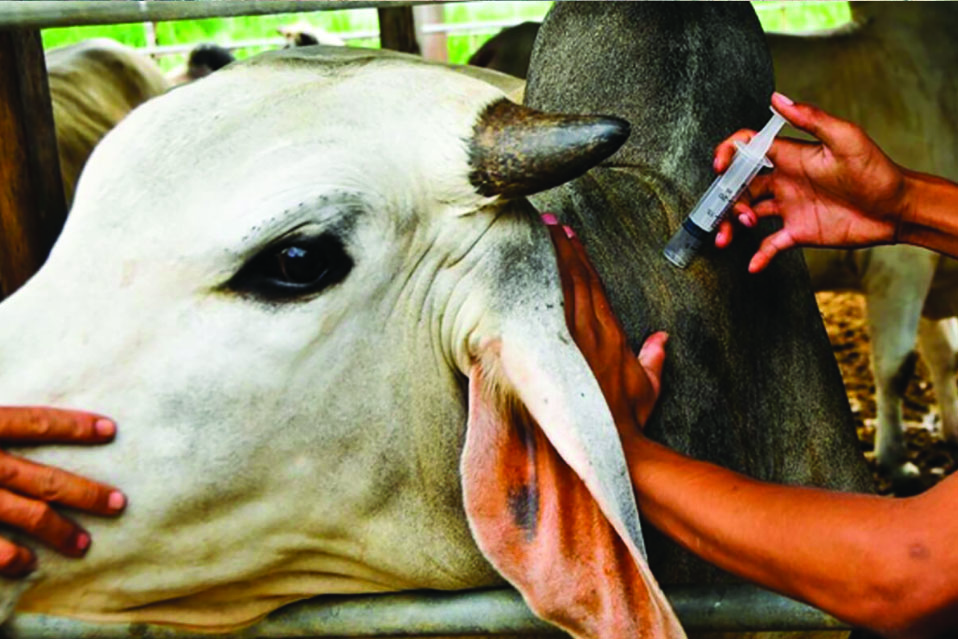
Livestock Development
1. Background
The IGAD region has a huge livestock resource base with estimated 373 million ruminants. This rich resource makes the IGAD region the most endowed in livestock resource in Africa. The region is also rich in diverse livestock and wildlife genotypes adapted to different agro-ecological zones which contribute significantly to food security, livelihoods and hard currency to member states. IGAD study also confirmed that the contribution of livestock to agricultural GDP in most of the MSs has been shown to be higher than what has been previously reported. The growth in livestock production, milk and meat in the IGAD region is low compared to the growth in demand of animal products. This is mainly due to poor animal health services, inadequate availability of feed, poor nutrition, low yielding breeds of animals and inadequate access to markets.
The market infrastructures are also poor and often lack among others; watering and feeding facilities. The border inspection posts are poorly staffed and with little cross-border animal health coordination and trading procedures are not yet harmonized. However, substantial numbers of live animals are crossing the borders in the IGAD region targeting the intra-regional and Gulf markets. In 2012, the MS exported 8. 6 million live animals through export quarantines available in the region to Middle East and North African countries. With regarding to value addition, little is done on milk, red and white meat, hides and skins and honey targeted for export.
The livestock sector has a number of challenges and constraints that require addressing in collaboration with public and private stakeholders and development partners at national and regional levels. Animals in the region cross national borders in search of water, pasture and for trade with little mechanisms in place for control and traceability. Controlling Trans-boundary Animal Diseases (TADs), particularly trade sensitive ones, is a shared concern and a high priority for member states.
With the implementation of the strategic plan, the department is believed to support MS to improve the performance of the livestock sector and enhance its benefits to the people of the region.
For more information contact:
Dr. Kathiya Dominic Lokeris
Ag. Head of Livestock Development/ SCIDA III Project Coordinator
Email: [email protected]
2. Ongoing and upcoming livestock projects
- Standard methods and procedures /SMP/in Animal Health (AUIBAR and IGAD/ICPALD; USAID financed )
- Improving Surveillance of Animal Diseases in IGAD MS (STSD) (AUIBAR and IGAD/ICPALD; EU financed )
- Veterinary Governance (AUIBAR, OIE, FAO and RECS ; EU financed ); IGAD component
- Participation of African Nations in Sanitary and Phyto-sanitary standard Setting Organizations (PANSPSO); (AUIBAR and RECs; EU financed ); IGAD component
- Improving supply of safe and quality livestock and meat exported from the Horn to the Gulf countries (IGAD/FAO; financed by Italian government)
3. Main activities /focus include:
- Support to member states (MS) in TADs control
- Support MS in livestock and meat trade enhancement
- Capacity building to public and private sector (North East Africa Livestock Council/ NEALCO)
- Sharing of good practices and lessons in different areas of livestock development
- Support MS in policy review, formulation and harmonization
- Strengthen laboratory, Epidemiology and CVOs networks

4.2 Livestock and livestock products trade enhancement
- ICPALD has been following up with standard-setting organizations to secure observer status for IGAD. IGAD secured observer status from CODEX, WTO-SPS committee, OIE and IPPC.
- Regional SPS committee and national SPS committee have been established for IGAD MS except for Somalia and Ethiopia, to be organized in June 2015. Regional Training of Trainers on the use of science-based methods and development of scientific arguments in standard setting was also provided.
- Promoting Horn‘s livestock trade through strengthening IGAD-GCC collaboration: The IGAD Secretariat’s delegation team made an official cooperation visit to Gulf Council Cooperation (GCC) in Riyadh, Kingdom of Saudi Arabia. The two parties agreed on the following future actions: Organize IGAD – GCC investment conference, finalization of the Memorandum of Understanding (MOU) and to organize and undertake an IGAD-GCC regional workshop on Animal Health focusing on the current efforts, challenges and joint future actions
- Support to private sector in Livestock; North East Africa Livestock Council (NEALCO): NEALCO is a regional livestock association established by national livestock stakeholders association from 13 countries (Djibouti, Ethiopia, Eritrea, Egypt, Kenya, Sudan, South Sudan, Tanzania, Uganda, D.R. Congo, Rwanda, Burundi and Somalia). The main mandate of the NEALCO will be to promote, coordinate, share information and advocate for enhanced livestock and livestock products trade in the livestock sector within and outside North and East Africa. IGAD/AUIBAR supported it to have its own strategic plan and was promoted to all stakeholders. Support is being provided to enhance its membership drive, partnership and resource mobilization
- Good practises and lessons on Hide and skin along the value chain documented and shared to MS: ICPALD also supported some MS to get resource and conduct national dissemination workshop for private sector involved in the subsector
- Situation analysis and capacity requirement of the Livestock Farmers’ Associations and Apex Organizations” in IGAD and EAC regions validated and development of support strategy and action plan done;
- Regional experience sharing visit was organized for mainly privates sectors from IGAD member states and Tanzania to the Ethiopian HACCP certified export slaughter houses and export feedlots. The participants underlined the visit was an eye-opener and appreciated their counterparts from Ethiopia. All agreed to work jointly for better compliance and growth together as the demand for livestock and livestock products are high within and outside the region
4.3 Mapping of cross border resources
Cross-border livestock markets, trade routes, services and priority trans-boundary livestock diseases were mapped and validated with MS. Based on the findings a draft project proposal prepared whose specific objective is to improve domestic, intra-regional and extra-regional trade in livestock and livestock products in IGAD member States. ICPALD is looking for resource to assist MSs on the improvement of the infrastructure
4.4 Coordination related
- Support to the regional livestock and pastoralism working group: In this technical platform, good practises and lessons in a number of areas presented and shared to relevant organizations in MS. Some of them are; Livestock value chain experiences of SNV, FAO Somalia and VSF (Germany), water for livestock, rangeland and fodder improvement, feed security, livestock data: challenges and suggestions, and standing wealth: pastoralist livestock production and local livelihood in Sudan
- Livestock and pastoralism sector workshop under the Climate Outlook Forum (COF); Organized Livestock and pastoralism parallel workshop, discussed the implication of the climate forecast on livestock growing communities and recommendations shared
Further information please contact
Dr. Ameha Sebsibe, Head of Livestock, ICPALD
ameha.sebsibe[@]igad.int

4. Some achievements and progress
The department commenced its work since September 2012. The achievements and progress made in collaboration with partners such as AUIBAR is summarized below
4.1 Control of Trans-boundary Animal Disease control (TADs)
- ICPALD and AUIBAR with MS and partners identified nine priority diseases (FMD, CBPP, LSD, RVF, PPR, CCPP, SGP, Camel pox and Brucellosis) on the basis of the perceived economic impact on trade; transmissibility and zoonotic potential and a harmonized Standard Methods and procedures (SMPs) were developed and validated for the above priority diseases. The MS are on the process of mainstreaming the SMPs in their disease control program. SMP has also been developed for use by the export quarantines in the region
- Veterinary Officers, laboratory technicians and export quarantine workers were trained on Epidemiology and Surveillance, inspection, certification, diagnostic technics, management skills, lessons and challenges to meet export requirements
- Developed and validated with MS the regional Guidelines for Animal Identification, Traceability (LITs) and Animal health Health Certification Systems. The guidelines will be soon published and distributed for utilization. ICPALD in collaboration with AUIBAR will also support two MSs to pilot LITs that will provide capacity and lesson for possible up-scaling in the region. A regional LITS and AHC forum has also been established to provide guidance and support MS to exchange of lessons in the area.
- Supporting MS to improve their capacity of undertaking active animal diseases surveillance through personnel training for labs, provision of reagents and cars and motor bikes. A regional coordination mechanism on disease surveillance is also put in place to enhance exchange of lessons and good practises and improve disease reporting.
- Developed and validated with MS the regional framework for progressive control of PPR and other Small Ruminant Diseases (SRDs). A regional coordination committee has also been established to provide guidance and support for MS to update or develop their national strategies and facilitate implementation
- The regional Animal Health Policy framework in the context of trade and vulnerability approved by MS has been sensitized to the relevant Ministries and has been instrumental in mobilizing funds from partners such as UASID, EU etc to undertake some regional TADs control projects. Further work required with MS and partners to domesticate it in MS
- Livestock Policy Hubs (LPH) have been established in all IGAD MSs to help with data collection and policy reviews and mainstreaming livestock programs into their national CAADPs.
- IGAD MS are supported to undertake livestock policy review and formulation, study on establishment of livestock fund and assessment of the impact of Livestock GDP study on investment
- IGAD/ICPALD in collaboration with FAO has facilitated cross border animal health coordination discussion between governments of Kenya and Uganda in Kampala and signed an agreement that led them to commence joint collaboration in the identified cross border districts. This lesson is shared and bilateral agreements are initiated for other bordering MSs
- ICPALD published regional and national (Ethiopia, Kenya, Sudan and Uganda ) policy briefs on the contribution of livestock to the economies of IGAD member states and the significance of non-wood forest products and artisanal mining to ASAL communities.



